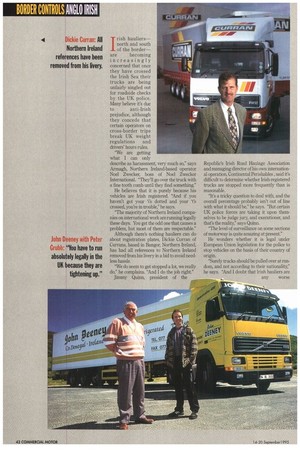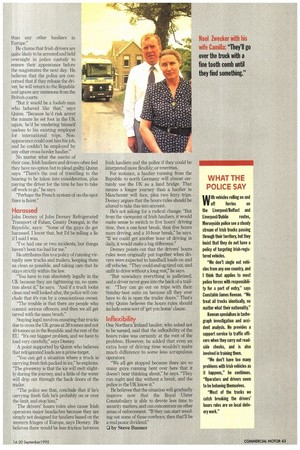4 Dickie Curran: All
Page 54

Page 55

If you've noticed an error in this article please click here to report it so we can fix it.
Northeni Ireland references have been removed from his livery.
Ifish hauliers— north and south of the border—
are becoming increasingly concerned that once they have crossed the Irish Sea their trucks are being unfairly singled out for roadside checks by the UK police. Many believe it's due to anti-Irish prejudice, although they concede that certain operators on cross-border trips break UK weight regulations and drivers' hours rules.
"We are getting what I can only describe as harassment, very much so," says Armagh, Northern Ireland-based operator Noel Zwecker, boss of Noel Zwecker International. "They'll go over the truck with a fine tooth comb until they find something."
He believes that it is purely because his vehicles are Irish registered. "And if you haven't got your I's dotted and your 'es crossed, you're in trouble," he says.
"The majority of Northern Ireland companies on international work are running legally these days. You get the odd one that causes a problem, but most of them are respectable."
Although there's nothing hauliers can do about registration plates, Dickie Curran of Currans, based in Bangor, Northern Ireland, has had all references to Northern Ireland removed from his livery in a bid to avoid needless hassle.
"We do seem to get stopped a lot, we really do," he complains. 'And I do the job right." Jimmy Quinn, president of the Republic's Irish Road Haulage Association and managing director of his own international operation, Continental Perishables, said it's difficult to determine whether Irish-registered trucks are stopped more frequently than is reasonable.
"It's a tricky question to deal with, and the overall percentage probably isn't out of line with what it should be," he says. "But certain UK police forces are taking it upon themselves to be judge jury, and executioner, and that's the reality," says Quinn.
"The level of surveillance on some sections of motorway is quite amazing at present."
He wonders whether it is legal under European Union legislation for the police to stop vehicles on the basis of their country of origin.
"Surely trucks should be pulled over at random, and not according to their nationality," he says. 'And I doubt that Irish hauliers are any worse than any other hauliers in Europe?'
He claims that Irish drivers are quite likely to be arrested and held overnight in police custody to ensure their appearance before the magistrates the next day. He believes that the police are concerned that if they release the drivel; he will return to the Republic and ignore any summons from the British courts.
"But it would be a foolish man who behaved like that," says Quinn. "Because he'd risk arrest the minute he set foot in the UK again, he'd be rendering himself useless to his existing employer for international trips. Nonappearance could cost him his job, and he couldn't be employed by any other cross-border haulier."
No matter what the merits of their case, Irish hauliers and drivers often feel they have no option but to plead guilty Quinn says. "There's the cost of travelling to the hearing to be taken into consideration, plus paying the driver for the time he has to take off work to go," he says.
"Perhaps the French system of on-the-spot fines is fairer."
Harassed
John Deeney of John Deeney Refrigerated Transport of Fahan, County Donegal, in the Republic, says: "Some of the guys do get harassed, I know that, but I'd be telling a lie ill said I was.
"I've had one or two incidents, but things haven't been too bad for me."
He attributes this to a policy of running virtually new trucks and trailers, keeping them as dean as possible, and taking care that he stays strictly within the law "Toll have to run absolutely legally in the UK because they are tightening up, no question about it," he says. "And if a truck looks clean and well looked after, the police will conclude that it's run by a conscientious owner.
"The trouble is that there are people who commit serious offences, and then we all get tarred with the same brush."
Staying legal involves ensuring that trucks due to cross the UK gross at 38 tonnes and not 40 tonnes as in the Republic and the rest of the EU. it's our biggest problem, and we have to load very carefully" says Deeney.
A point supported by Quinn who believes that refrigerated loads are a prime target.
"You can get a situation where a truck is carrying fresh fish packed in ice," he explains. "The giveaway is that the ice will melt slightly during the journey, and a little of the water will drip out through the back doors of the trailer.
"The police see that, conclude that if he's carrying fresh fish he's probably on or over the limit, and stop him."
The drivers' hours rules also cause Irish operators major headaches because they are simply not designed for hauliers based on the western fringes of Europe, says Deeney. He believes there would be less friction between Irish hauliers and the police if they could be interpreted more flexibly; or rewritten.
For instance, a haulier running from the Republic to north Germany will almost certainly use the UK as a land bridge. That means a longer journey than a haulier in Manchester will face, plus two ferry trips. Deeney argues that the hours rules should be altered to take this into account.
He's not asking for a radical change: "But from the viewpoint of Irish hauliers, it would make sense to switch to five hours' driving time, then a one-hour break, then five hours more driving, and a 10-hour break," he says. "If we could get another hour of driving in daily, it would make a big difference."
Deeney points out that the drivers' hours rules were originally put together when drivers were expected to handball loads on and off vehicles. "They could end up tired out, and unfit to drive without a long rest," he says.
"But nowadays everything is palletised, and a driver never goes into the back of a trailer. "They can go out on trips with their Sunday-best suits on because all they ever have to do is open the trailer doors." That's why Quinn believes the hours rules should include some sort of `get you home' clause.
Inflexibility
One Northern Ireland haulier, who asked not to be named, said that the inflexibility of the hours rules was certainly at the root of the problem. However, he added that even an extra hour of driving time wouldn't make much difference to some less scrupulous operators.
"We all get stopped because there are so many guys running bent over here that it doesn't bear thinking about," he says. "They run night and day without a break, and the police in the UK know it."
He believes that the situation will gradually improve now that the Royal Ulster Constabulary is able to devote less time to security matters, and can concentrate on other areas of enforcement. if they can start weeding out some of these cowboys, then that'll be a real peace dividend." [:=I by Steve Banner
















































































































